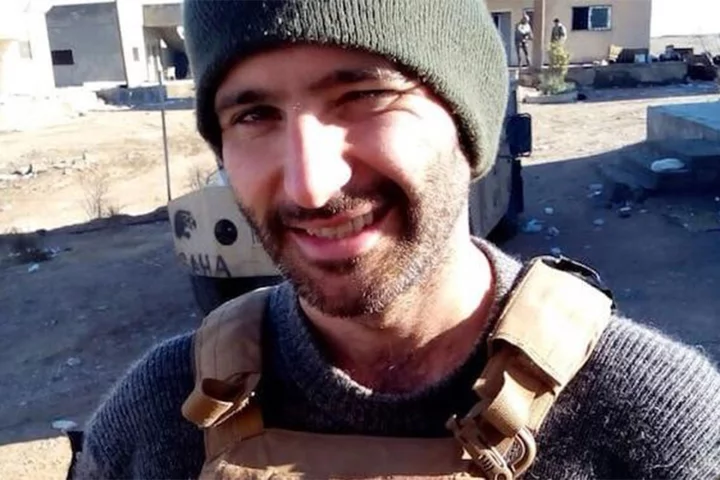
Body found in search for missing ex-British soldier fighting in Ukraine
A body has been found in the search for a former British soldier who went missing while fighting in Ukraine. Ex-paratrooper Daniel Burke, 36, of south Manchester, was reported missing by his family on 16 August after he had travelled to join the fighting in 2022. Greater Manchester Police said on Saturday that officers were working with Mr Burke’s family and the Ukrainian authorities to identify the body found and to bring him back to the UK. Mr Burke’s mother Diane Sniath told the BBC that “this is the moment I have been dreading”. His family told the broadcaster that the body was found in Zaporizhzhia, which lies about 27 miles from the front line. Detective Superintendent Lewis Hughes who is GMP’s Lead for Disaster Victim Identification said: “This is an upsetting time for Daniel’s family, we have family liaison officers in contact with the family and offering support. “My team and I are working with the Ukrainian authorities to make formal identification with a view to repatriating Daniel following that process. “Daniel’s family have asked for privacy at this difficult time.” Mr Burke, who previously served with the Parachute Regiment, told the BBC on 6 August that he planned to join a Ukrainian army unit to fight against Russian forces. In 2019 he spent eight months in prison accused of terror offences after going to Syria to fight with Kurdish militia against the Islamic State group. All the charges against him were dropped in 2020, the BBC reported. At least 10 other British men have died in Ukraine since the Russian invasion began last February, according to the Foreign Office. Last week, tributes were paid to former Scots guard Jordan Chadwick, 31, from Burnley, who left the UK to travel to the country in early October 2022 to “support freedom”. And in August, Sam Newey, 22, died while serving on the front line in Eastern Ukraine on Wednesday, according to his brother, who said he was “proud” of his sibling. Read More Ukraine-Russia war – live: Putin’s forces suffer ‘significant losses’ as Kyiv vows more drone strikes Kim Jong-un shown Russia’s nuclear capable bombers and hypersonic missiles UK officially bans Russia’s Wagner paramilitary group as terrorist organisation Unesco adds two locations in war-ravaged Ukraine on its list of historic sites in danger American XL Bullies amnesty to come before ban as breed ‘linked to half of attacks’ How will American XL bully ban work and what happens if you own one? Russell Brand denies ‘very serious allegations’ related to ‘promiscuous’ past
1970-01-01 08:00
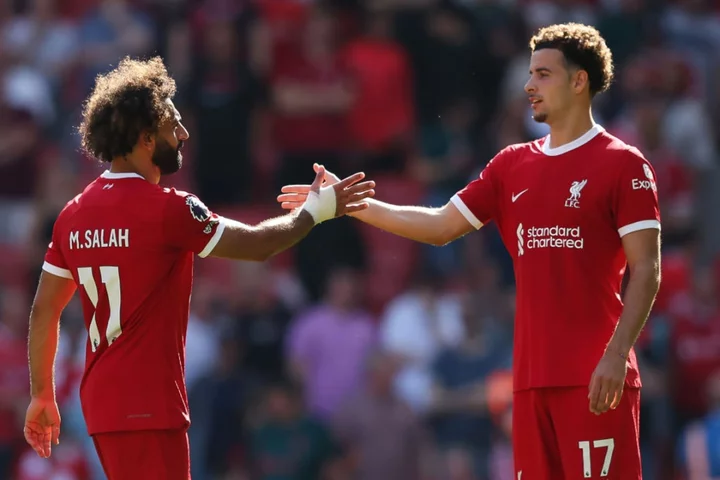
Wolves vs Liverpool LIVE: Premier League team news, line-ups as Quansah starts for the Reds
Liverpool are taking on Wolves at Molineux today as the Premier League returns following the international break. Jurgen Klopp’s side enjoyed an impressive start to the season, winning three and drawing one of their opening four games to find themselves third in the early table, including a stunning 10-man victory over Newcastle at St James’ Park before despatching Aston Villa 3-0. “We would’ve loved to have carried on after the Aston Villa game, which was a really good game,” Klopp said this week, ruing the two-week gap. Wolves manager Gary O’Neil has endured of baptism of fire after suddenly taking charge before the start of the season. A 1-0 win at Everton brought the only points from their first four games, and he has warned his Wolves players they will have to be at their very best to beat a Liverpool side he is tipping to challenge for the title. “I’ll be very surprised if they’re not right at the top this year,” O’Neil said. Follow all the latest from the Premier League match below. Read More Is Wolves vs Liverpool on TV today? Kick-off time, channel and how to watch Premier League fixture What Mohamed Salah’s dressing room speech says about Liverpool future Erik ten Hag says he inherited Manchester United with ‘no good culture’
1970-01-01 08:00
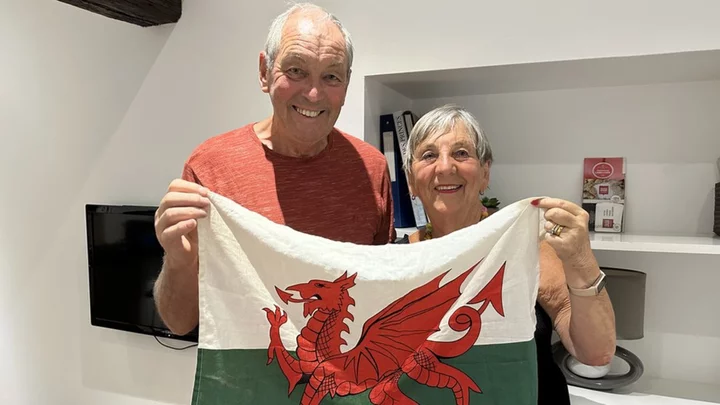
Rugby World Cup: Fan spends 80th birthday interrailing in France
Ann Williams and husband Wyn are interrailing around France to watch Wales in the Rugby World Cup.
1970-01-01 08:00
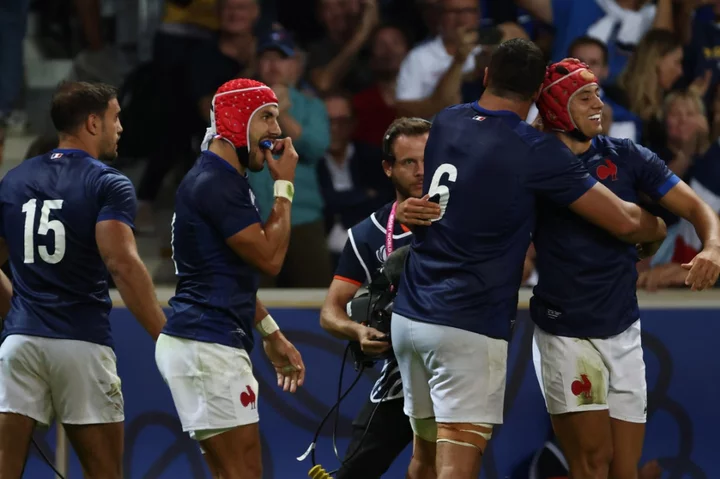
France given huge Rugby World Cup scare by minnows Uruguay
France eventually saw off a brave Uruguay to continue their perfect start to the Rugby World Cup after grinding out a 27-12 win at Stade Pierre-Mauroy in Lille. Anthony Jelonch returned from a lengthy ACL injury absence to captain the team as part of 12 changes to the starting XV which had opened the tournament with an impressive victory over three-time world champions New Zealand in Paris. Les Bleus went in front from an early Melvyn Jaminet penalty after Uruguay had collapsed the scrum. The home fans, though, were then left in stunned silence when Jaminet failed to gather a deep cross-field kick out on the touchline. Nicolas Freitas picked up the loose ball to dart down the left and score in the corner. France responded with a try in the 11th minute when Antoine Hastoy burst through off the scrum, which Jaminet converted and then further extended the lead with another penalty. Romain Taofifenua was sent to the sin bin after the French lock caught Santiago Arata high with his shoulder going into a tackle – which remained at a yellow card after review by the TMO, Welshman Ben Whitehouse, when on another night it could have been deemed a red. Uruguay, playing their first match in Pool A, had a try ruled out in the 35th minute when Felipe Etcheverry dived over, with Tomas Inciarte penalised for an obstruction in the build-up as France went into half-time 13-5 ahead. France thought they had scored a try early in the second half when Gabin Villiere collected a loose ball to run in, but it had been inadvertently knocked on off Anthony Jelonch’s shoulder. Uruguay then reduced the deficit to 13-12 after Baltazar Amaya powered over in the corner and Etcheverry made the conversion. France, though, responded again when Peato Mauvaka touched down under the posts after a fortunate ricochet from Etcheverry’s clearance to settle the home fans’ nerves once again. Any hopes of a comeback from Los Teros were finally ended after Louis Bielle-Biarrey went over in the corner before Sekou Macalou’s breakaway 80-metre try was ruled out by the TMO for kicking through the ruck as Les Bleus failed to claim a four-try bonus point. Read More Elliot Daly eager for England to display attacking talent against Japan Rugby World Cup 2023 TV schedule: Channels, times and how to watch every fixture online South Africa explain use of traffic light signals during Scotland win France v Uruguay LIVE: Rugby World Cup result and reaction South Africa’s ‘X-factor’ will make them tough to beat claims Gareth Thomas France turn to their back-ups as Fabien Galthie rings the changes for Uruguay test
1970-01-01 08:00
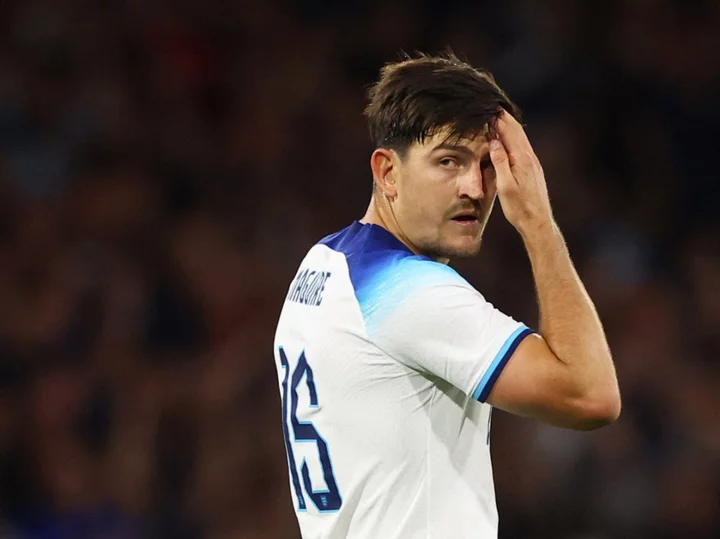
Harry Maguire’s mother hits out at ‘disgraceful’ criticism of England and Man United defender
Harry Maguire’s mother has hit back on social media and defended her son after the centre-back received more criticism in the wake of his latest performance for England. Maguire came off the bench at half-time as England won 3-1 against Scotland on Tuesday but the former Manchester United captain came under fire once again after scoring an unfortunate own-goal. The 30-year-old has endured a tough spell in recent months but remained in Gareth Southgate’s England squad despite falling down the pecking order at Old Trafford. The England boss came to his defence in the post-match press conference, with Maguire’s mother, Zoe, now also voicing her opinion in a social media post that criticised the abuse he has received. “As a mum seeing the level of negative and abusive comments in which my son is receiving from some fans, pundits and the media is disgraceful and totally unacceptable to any walk of life never mind someone who works his socks off for club and country,” she said on Instagram. “I was there in the stand as usual, it’s not acceptable what’s been created, over nothing. I understand that in the football world there are ups and downs, positives and negatives but what Harry receives has gone far beyond ‘football’. For me seeing him go through what he’s going through is not ok. “I would hate to have to see any other parents or players go through this in the future, especially the young boys and girls breaking through the ranks today. Harry has a massive heart and it’s a good job he’s mentally strong and can handle it as others might not be able too. I wish this sort of abuse on nobody!” Maguire started England’s first game of the international break - despite not starting a game for his club so far this season - as Southgate’s side drew 1-1 with Ukraine in Poland. The defender has been a mainstay in Southgate’s England side throughout his tenure in charge of the national team and the England boss issued an impassioned defence of Maguire after the Scotland game, labelling the constant criticism of him “ridiculous” and “a joke”. “It is a consequence of ridiculous treatment of him for a long period of time, frankly,” Southgate said. “I’ve never known a player treated the way he is – not by the Scottish fans, by our own commentators, pundits, whatever it is. “They’ve created something that’s beyond anything I’ve ever seen. He’s been an absolute stalwart for us in the second-most successful England team for decades. He’s been an absolutely key part of that. “I’ve talked about the importance of our senior players. He’s been crucial amongst that. Every time he goes on the field, the resilience he shows, the balls he shows is absolutely incredible. He’s a top player and we’re all with him and our fans were brilliant with him tonight.”
1970-01-01 08:00
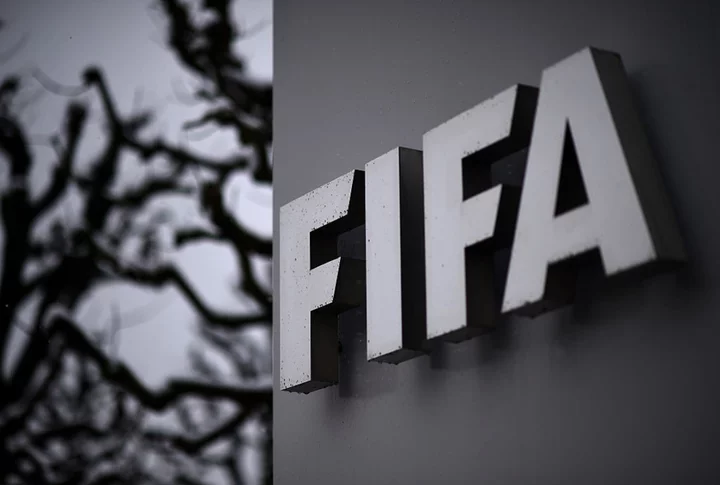
How Fifa is leading the push for football transfers’ biggest change since Bosman
As with so much in modern football, a moment that could transform the entire game is set to come far away from the pitch, and probably in court. Fifa is currently in a battle with most of the game’s agents, although the global governing body would not characterise it as that. Officials insist they are simply engaging in a reform of the industry that “everyone except some agents consider absolutely necessary to address widespread abuses and a system currently fuelled by speculation”. That extends to all of the game’s major stakeholders and the primary European institutions – from the European Commission to the Council of Europe – who have long asked Fifa to “do something”. The position on the other side, most notably the Association of Football Agents [AFA], is that this does indeed come down to European law - but not in the way people at Fifa think. They are strident that the federation has no legitimacy to regulate on this. The view is that representing players is a business outside of the running of the game, and that the provisions for the forthcoming Fifa Football Agent Regulations [Ffar] go against European Union anti-trust law - especially as regards forbidding payment to a supplier above a certain level. The Court of Arbitration for Sport did rule in July that Fifa has legitimacy here, but a referral from a District Court in Germany has brought the case before the European Court of Justice [ECJ]. If this already seems a dry back-and-forth of legal claims, it will all have significant influence on how the very sport is played. Not exactly a new Bosman ruling, but a potentially transformative case all of its own that does come down to far bigger issues such as sport versus business and what any cultural model of football should be. Fifa’s entire position is that it is addressing what is good for the game rather than actually taking on the representative industry. “Good agents are hugely important,” says Jan Kleiner, Fifa’s Director of Football Regulatory. “But since agents act at the very centre of the international football transfer system, Fifa has the authority and responsibility to regulate their activities within that system.” The root motivation of the reform is that the current transfer ecosystem incentivises the movement of players, primarily through the focus on commissions, which accelerates the market and concentrates increasing money at the top end of the game so affecting competitive balance. As justification for this, Fifa relates a few key figures. Every year, players move more quickly and more often between clubs. Every year, 10 times more money is paid to agents than paid to grassroots clubs. Every year, the money spent on transfers grows, as do service fees paid to agents. A 400% increase in the latter over the last decade saw a record of $696.6m (£557.3m) in this window, representing nearly 10% of the total spending on transfer fees. That has gone hand in hand with the growth of so-called “super agencies” and conglomerations, the largest of which is CAA Stellar. The current conditions are seen as perpetuating their domination. Pointedly, as regards big agency domination, even smaller agencies and independents dispute that. They say Fifa’s plans will merely strengthen the power of the “supermarket model”, since the larger companies will be able to weather the greater costs. There is also an insistence one of many unintended consequences will be the entry of more unscrupulous agents due to a willingness to offer what other representatives won’t. The view of one lawyer working with the AFA is that the idea it is agent commissions driving the market is “beyond making any sense”. All of the demand comes from the clubs. They are willing to pay the players so much as part of what has become a financial arms race, and agents merely mediate this. There is also a belief that many of the economic issues that Fifa describe also come from systemic dysfunctions and inequalities in football’s ecosystem, that any problems with agents are only a symptom of. “People read cartoon descriptions of agents from rare transfers that bear no relation to the actual reality of the industry,” one prominent agent privately argues. The fact that the AFA’s legal challenge against the regulations takes place in the last 10 days of September has limited the ability of many involved to speak openly on this. That comment still points to one of the many tensions at the core of this. There are then separate but bigger concerns about how the current system has brought reports of unethical and criminal behaviour, as well as cases of abuse and even human trafficking. With the matter going before the ECJ, Fifa is confident the European judges will understand the specificities of the football industry. The agents are concerned Fifa doesn’t understand their business. “They don’t know the specifics because they only see the surface,” was one response. This is a shared view even among agents who despise each other – a common enough theme – although some recognise a need for reform. This is where Fifa would rebut the idea it is ignorant to the business. It points to a five-year consultation process that involved FifPro, the European Club Association, the World Leagues Forum as well as member associations and confederations, and “a large number of agents and agent representative organisations”. Fifa insists that feedback is overwhelmingly positive, even from agents and agent organisations. The head of one major football body insists the requirement for better agent regulation is “inarguable” and unanimous, and many would point to how all of the major American sporting associations have the same rules that Fifa is trying to introduce, including almost identical caps on commission. Against that, high-profile agents say there was “a lack of invitation” and that there has “never been any public disclosure of these consultations”. Fifa expressly states this is factually wrong, and that there was both invitation and disclosure as illustrated on their website. Sources within the global body argue that all representative organisations were invited but some of the biggest agents just refused to engage, and that this is now seen as a litigation strategy to delegitimise the entire process. Either way, if Fifa has succeed, their reforms will bring the following: The establishment of a licensing system, involving an exam A requirement for agents to provide full transparency towards clients about payments they receive The payment of agent service fees via the Fifa Clearing House, as a measure against financial crime and to protect financial integrity The prohibition of multiple representation, so an agent can only work for any one party in a transaction Stricter regulations for the representation of minors The establishment of a mandatory service fee cap, to avoid excessive financial incentives and conflicts of interest It is the last of those that has provoked the fiercest dispute from agents, beyond the opposition to the basic premise of Fifa regulating. The cap is being described by lawyer Philip Wehler as a “hard-core, anti-competitive measure fixing purchase prices” that represents a “violation of EU anti-trust laws”. Fifa’s position is that to protect the functioning of its transfer system in line with its 2001 agreement with the European Commission, a cap is necessary to reduce existing financial incentives which promote player movement. It is also said that the cap is a pro-competitive measure, because lump-sum commissions have such a destabilising effect on the economic make-up of the game. Aside from how they incentivise movement, only a handful of clubs can pay the £20m minimum commission required for most top talent, further concentrating that talent among six to eight teams. There is also the argument that the very nature of modern football ensures that the more money that swirls around the more player wages at a narrowing top end in an escalating arms race. Fifa wants to reduce transfer incentives and nuance how service fees are paid, so they are proportionate to salary. This would in essence mean the interests of player and agent are more aligned, increasing transparency regarding what footballers pay for. As it stands, Fifa posit, commission on fees cover a wide range of service that agents otherwise tell their players is “for free”. A series of agents spoken to for this article say that reflects Fifa’s misunderstanding of the business. For one, they argue, service fees aren’t just for transfers. They’re also for contract extensions, and the majority of good agents would never push a move their client doesn’t need, since this would be bad for everybody in the long term. What’s more, all modern agents right down to independents are expected to have office premises, player care staff, media, social media and scouts, not to mention a lot of expenses on travel. All of this is to serve the player and “has a direct correlation to performance”. Fifa admits it’s a “cultural shift” to charge players for this at base, but that it’s a more “transparent and fair” way of doing business. “It is difficult to understand why agents would not be able to issue transparent invoices to their clients for all additional services, which are not subject to the cap,” Kleiner says. Agents would respond that the cultural shift would be agent income being restricted at the exact point players expect greater service. That could also lead to the unintended consequence of further incentivising transfers since some agents would instead just seek more commissions. “It’s like a streaming service saying if artists aren’t happy with their royalties they can do more concerts,” one agent says. “Could they do it? Yes. Is it a solution or even rational? No.” The argument is again that super-agencies could more easily absorb this. Fifa would also point out that the cap wouldn’t apply to sponsorship or any endorsement deals. The agents say that the vast majority of players – right up to mid-table clubs in even the Premier League – don’t have commercial appeal so would end up being the ones punished. As regards the question of representing multiple or all parties in the same transfer, the motivation behind this is pure transparency and to avoid a conflict of interests. The argument on the other side is that it’s simply what the relevant parties agree. Fifa would say it is important because it could theoretically mean players don’t have the same level of information as their agents. There is also pushback on the point of how more money goes to service fees than grassroots since they are seen as two unrelated areas. Agents say they only take a percentage of a player’s salary, and that has nothing to do with money coming from or going to grassroots. It is viewed by one representative as a false comparison to further a caricature. Fifa would counter that it is highly corrosive for the game’s solidarity if so much money leaves its ecosystem, and that it is necessary for redistribution mechanisms to function. The argument there is to ensure less money goes to off-shore accounts or impenetrable tax havens, with that increasing financial transparency and integrity. Agents based in England argue there is already a workable clearing house in the country. Fifa would respond they have to take a “global perspective” and create a level playing field, which would consequently mean the changes for those in England wouldn’t be that dramatic. One argument outside England, however, is that amounts to control of a money-flow that further facilitates uncompetitive price-fixing. Even on the issue of minors, agents would dispute Fifa’s position, insisting they require representation the most. The reality will still be that clubs want to sign the most promising young players. An absence of representation could just lead to more unscrupulous actors or illegal payments. Fifa’s position is that the rules do not prohibit representation of minors, but set a reasonable and proportionate framework. If all this sounds like the “wild west” on a market that Fifa says is a description from an agent, another counterpoint is that this description only arose after 2015. That was when the global governing body decided to deregulate the agency business, which agents argued against, and points to why they should be listened to now. Fifa actually admits that was “a mistake by the old administration”. “But we could have continued to do nothing,” one source says. “Those agents who want to work in a transparent manner have nothing to fear.” The issue of licensing is the one area where there is common ground. Otherwise, differences abound. Many will be laid out in the legal challenge in England, where some high-profile agents will be cross-examined. A decision on that will come at some point before the new regulations are implemented as planned on 1 October. The one country that could be exempted is Germany, due to a successful provisional injunction and an appeal by Fifa that won’t be heard until 24 January. That could bring a “scattered landscape” that the governing body would have to work around, and could create loopholes, before a potential hearing in front of the ECJ and regional courts. Petros Mavroidis, a Greek-Swiss professor who has worked on football issues right up to Financial Fair Play, believes the entire case is “going to be instructive” for the future of the game. “It went before CAS and it was decided that Fifa has the right to regulate football agents. Now is the similar case before a German court that will end up before the European Court of Justice. “If I go by past evidence, the European Court of Justice doesn’t pay too much heed to CAS. “If this happens, I would expect the court to start and ask who has the right to regulate agents. Have member states transferred this right to Uefa/Fifa? And if yes, let’s assume yes, does Fifa observe European law when regulation agents? If no, it’s the end of the story. Fifa cannot regulate, and leave it at that. “It’s very difficult to predict what will happen but, no matter what, even if the court says Fifa can regulate, it will say it has to observe EU law. That means observing competition law, so the question will be can Fifa impose price regulation.” Fifa says it comes down to a simple motivation for them. “Ultimately, you always have to look at the counter-factual,” one source says. “What would happen if you didn’t implement these rules? Inequality increases in the game, existing problems become worse and worse, and regulation becomes inevitable.” Read More Sarina Wiegman wants focus on Spain’s World Cup winners and not Luis Rubiales Sarina Wiegman ‘worried’ about schedule as England prepare for Nations League Luis Rubiales refuses to apologise to Jenni Hermoso over ‘consensual’ kiss Luis Rubiales resignation has to be ‘the start of something’, says Georgia Stanway Jenni Hermoso complaint against Luis Rubiales filed with Spain’s high court Stephen Kenny refuses to bemoan luck following Evan Ferguson injury
1970-01-01 08:00
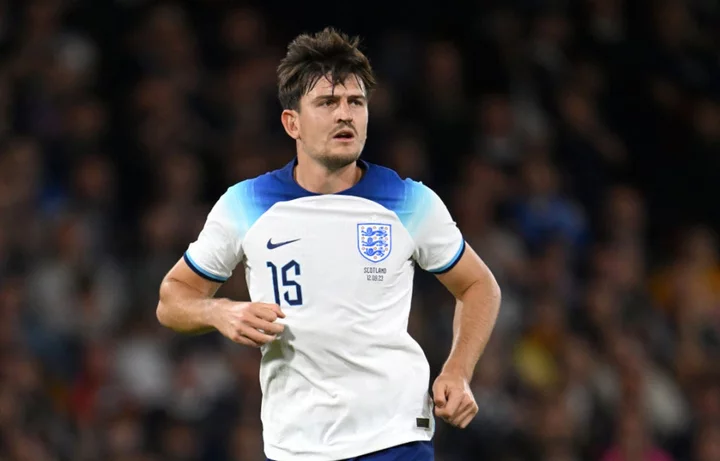
Harry Maguire’s latest challenge will be to rise above the tag of being a part-time player
The hesitation was telling, the first word something of a filler. The question may well have been one Gareth Southgate also asked. Why, when there was the chance of a move to West Ham, the prospect of first-team football and the opportunity of something equating to a new start, did Harry Maguire opt to stay at Manchester United? “Erm,” he began. “Well, I think it was a bit of both. Erm… how can I put this? We just didn’t come to an agreement and they were happy for me to stay and I was happy to fight for my place. I want to do that and every time I train or play I will give everything.” Which scarcely felt the most convincing of explanations, even if it hinted at a hold-up. The bare facts are that United accepted a £30m bid from West Ham; there was agreement there. Where the three parties could not all concur, then, was on the issues of remuneration and recompense. Maguire’s wages actually went up this summer, as a result of United’s qualification for the Champions League. West Ham were unlikely to pay him at a rate commensurate with a status as the world’s most expensive centre-back. The sense is that a pay-off was required but not agreed. It is not the only factor, as Maguire suggested. Erik ten Hag has demoted the 30-year-old, first from the team, then from the club captaincy. But he has never forced him out. The United manager wants two players for every position; he sees Maguire as one of his centre-back options. Admittedly, he often seems fifth in line: Raphael Varane and Lisandro Martinez became established as the preferred pairing last season, with Victor Lindelof a reasonably reliable deputy. Ten Hag is reluctant to use Maguire on the left and would rather field Luke Shaw there. To the outsider, the prognosis for Maguire looks bleak. Yet he has confounded expectations before: playing in League One at 21, he was a World Cup semi-finalist four years later. Footballers require a belief in their ability; there have been times on the pitch in the last two years when Maguire has looked to be suffering from a crisis of confidence but he sounded positive. “At club football, I want to play games, I want to play football,” he said. “The first four weeks were hard because it was one game a week and the manager didn’t select me but we have lots of games coming up now and I am sure I will play lots of games.” His first appearance of the campaign came as a substitute at Arsenal; with Shaw and Varane injured, his next outings may depend on whether Martinez, who came off at the Emirates Stadium, is also sidelined. His last game brought an own goal, benefitting Scotland. Southgate came to the centre-back’s defence after an evening of mockery at Hampden Park when it seemed as though Scotland’s new national sport is taunting Maguire. Nevertheless, his job would be easier if Maguire had joined West Ham, just as it would be had Jordan Henderson not signed for Al-Ettifaq. Leaving Old Trafford would have been a way of protecting his international place. “Of course, my England career is a big priority,” Maguire countered. “And so is my club career. I considered everything and I know, at the moment, when I have not started a game in the first four games of the season, the story comes to me. I finished off last season with two very strong performances for England and I have played in all five matches to help put us where we are in qualifying, so I need to keep performing when I get chosen.” And yet he can feel a part-time footballer, playing for country more than club. Maguire denied rustiness was a problem against Scotland, saying Southgate was very happy with his performance against Ukraine. His night in Glasgow, however, was notable for the reaction of the Scotland supporters and the goal he dispatched past Aaron Ramsdale. “Obviously, I am disappointed with the own goal but that is football,” Maguire said. “You are a centre-back and you put yourselves in those positions. I am really pleased with how I performed in the second half and how I dealt with it. Little things can go against you and one moment went against me. That is part and parcel of a defender.” Sadly for Maguire, he was already ridiculed at Hampden even before he accidentally converted Andy Robertson’s cross. He found an advantage among the ridicule. “It pretty much takes the pressure away from my teammates and puts it all on myself,” he said. “I would not say I am a person who struggles with pressure mentally, I have been through a lot in the last couple of years.” If anything, that felt an understatement. The next year assumes an importance, too. Southgate’s faith in Maguire appears unyielding, but a season on the sidelines at United could test it anyway. By opting not to leave, Maguire risked his place at Euro 2024. “It is way too far away to consider,” he argued. “I take everything as each week goes by.” But he could do with some good weeks at the club he perhaps should have quit. Read More Harry Maguire says he can deal with pressure after ‘banter’ from Scotland fans Bale shows his golf skills and Stokes goes big – Wednesday’s sporting social Criticism has not affected Harry Maguire, says England team-mate Aaron Ramsdale ‘Top-level’ England are the benchmark for improving Scotland – Lewis Ferguson Gareth Southgate says Harry Maguire criticism ‘beyond anything I’ve ever seen’ Maguire’s humiliation is complete — Southgate must save him from himself
1970-01-01 08:00
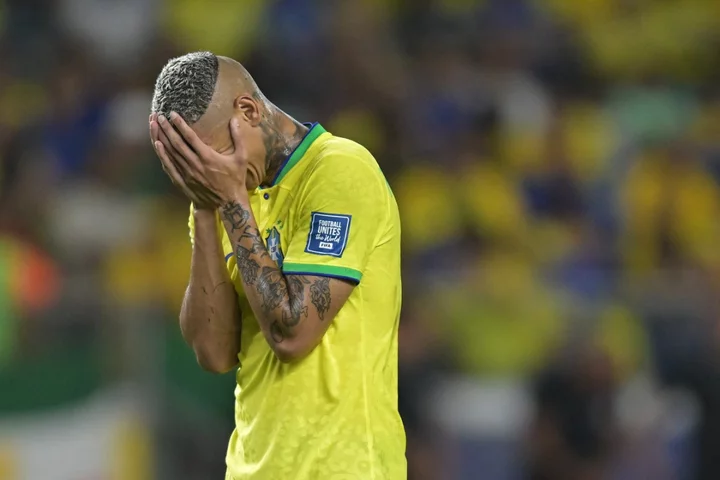
Richarlison to seek psychological help after tears in Brazil
Tottenham forward Richarlison says he will “seek psychological help” after being seen in tears following his substitution during Brazil’s 5-1 win over Bolivia last Saturday. The 26-year-old says he his emotional reaction in the match was a release to help ‘get things happening off the pitch out of his system’. "I went through a turbulent time off the pitch during these past five months," he told Brazilian newspaper O Globo who reported that Richarlison has split with long-term agent Renato Velasco. "Now things are a bit more stable at home. People who only had their eye on my money are no longer close to me.” The Brazilian joined Spurs for £60m from Everton last summer but has only scored four goals in 40 games. However, he is determined to perform well for the north London side and is planning on seeing a psychologist to help improve his mental health. "Things are going to flow now and I’m certain that I will have a good run at Tottenham and will make things happen again,” he claimed, "I’m going to return to England and seek psychological help, from a psychologist, to strengthen my mind. That’s what it is about, to come back stronger.” Richarlison missed a great opportunity to score in the World Cup qualifier against Bolivia before being taken off the pitch. He explained that the pictures of him in tears were not down to his performance but off-field issues. "That moment of sadness wasn’t about having played badly," he said when explaining why he begin to cry. "In my opinion, I didn’t play a bad match in Belem. It was more about getting the things that were happening off the pitch out of my system, which had gotten out of control not because of anything I’d done but because of people close to me." Tottenham host Sheffield United on Saturday with Brazil’s next qualifier coming against Venezuela on 13 October. Read More Forest defender given suspended five-month suspension after 375 betting breaches Former Lioness Fara Williams on the sexist and homophobic abuse she gets online South Africa’s ‘X-factor’ will make them tough to beat claims Gareth Thomas
1970-01-01 08:00
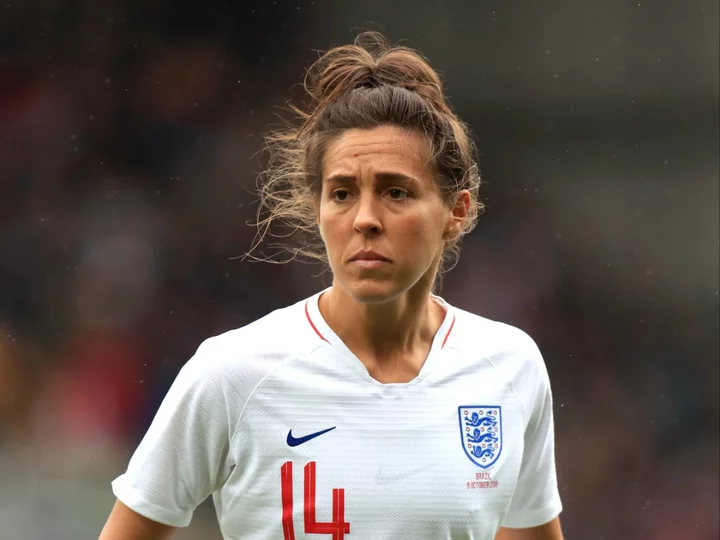
‘Get back in the kitchen’: Lioness Fara Williams on the aggressive sexist and homophobic abuse she gets online
Former England footballer Fara Williams has spoken out about the sexist and homophobic abuse she has suffered online, saying she’s been told to “get back in the kitchen”. In an exclusive interview with The Independent, the ex-midfielder turned football pundit said trolls question her knowledge of the sport, telling her she knows “nothing about the game”. The 39-year-old, who is England’s most capped player, said the online abuse is “definitely sexist” and gets worse and is “more aggressive” when she is reporting on men’s football rather than the women’s game. “When I’m doing punditry in a women’s game, the percentages in terms of the abuse you get is really, really minimal compared to when as a female, I talk on the men’s game as a pundit,” Williams said. “The abuse heightens and it’s more aggressive, more direct. Definitely more abusive.” The football commentator said she thought “jealousy” was “probably one of the main things” which drives people to perpetrate online abuse. She said many people think trolls are people who you are “really close to”, adding: “You get trolled by people that you think are your friends and they are the ones that know the most about you.” The former Lioness said she is able to cope with the online hate because she has a “thick skin”, but her ability to handle abuse could potentially change if the harassment were to ramp up. The “daily” abuse suffered by footballers she used to play with who are now prominent in the media is “not acceptable”, she stated. Ms Williams added: “I’ve seen a change in them as people because of social media – close friends that have really been affected by some of the awful abuse that they get online.” She said: “If you are bombarded with abuse daily, at some point it will affect your mental health, whether you think you are strong headed or not.” Ms Williams said: “As I said, I’m quite strong headed now, but there is nothing to say that if I was to be absolutely bombarded with abuse on a daily basis, that couldn’t change how I start to think and see myself.” Her friends are targeted with “horrific abuse” for simply “having an opinion in a workplace that they are supposed to have an opinion in”, she added. Discussing homophobic online abuse, she said: “I’m sure they’re aware that there are a lot of gay people within the women’s game, and it’s easy for them to drop a comment in.” Ms Williams, a member of Hope United, a team of footballers committed to tackling online sexist hate, reflected on whether the abuse she endures would worsen if her punditry for men’s football ramps up. "They could talk about the way I talk, the way I look, the way I sound,” she added. “Who I think I am.” Ms Williams said she hoped abuse on social media would improve when the online safety bill is rolled out as a change in the law would make people “accountable” for their comments. The legislation, which aims to tackle hate speech, cyberbullying, and disinformation, is in its final stages in parliament and would see social media companies also held accountable for abuse published on their sites. The ex-footballer attended a roundtable meeting at 10 Downing Street on Tuesday to demonstrate her backing for proposed changes to the online safety bill, which would boost the online protection of women and girls. “For me, social media has become a fantasy world where you can do whatever you want and get away with it without any consequences,” Ms Williams said. Turning her attention to the World Cup kiss saga, she said it was “disappointing” that it “took so long” to be dealt with. Her comments come after the president of the Royal Spanish Football Federation Luis Rubiales has come under sustained criticism for kissing player Jenni Hermoso on the lips after Spain secured their 1-0 win over England last month. Rubiales, who was also condemned for grabbing his crotch after Spain won the women’s world title for the first time in history, refused to step down over his behaviour but was suspended by Fifa. He eventually resigned as president on Sunday, after weeks of pressure, after Hermoso filed a legal complaint. Jorge Vilda, head coach of Spain’s women’s team, was fired last week after he was among those who praised Rubiales’ refusal to step down. “It’s the only thing that’s been spoken about when Spain were phenomenal in the World Cup and these women should be celebrated,” she added. “For me, it’s a celebration of their success and I think that’s been forgotten and the girls probably haven’t been able to celebrate.” Discussing Rubiales, she said: “I think the right thing has been done now. He stepped away from it. He still hasn’t apologised.” Read More Fara Williams: England’s most-capped footballer announces retirement England winning Euro 2022 ‘a real proud moment’ for ex-midfielder Fara Williams Jill Scott says World Cup kiss saga ‘overshadowed’ Spanish women’s team playing ‘great football’ Lioness Demi Stokes says misogynistic abuse online ‘really affected’ England players’ game ‘History in the making’: Lionesses’ Euros success sparks booming interest in women’s football Women’s sport is bigger and better than ever in 2023 – rundown of the best in the calendar
1970-01-01 08:00
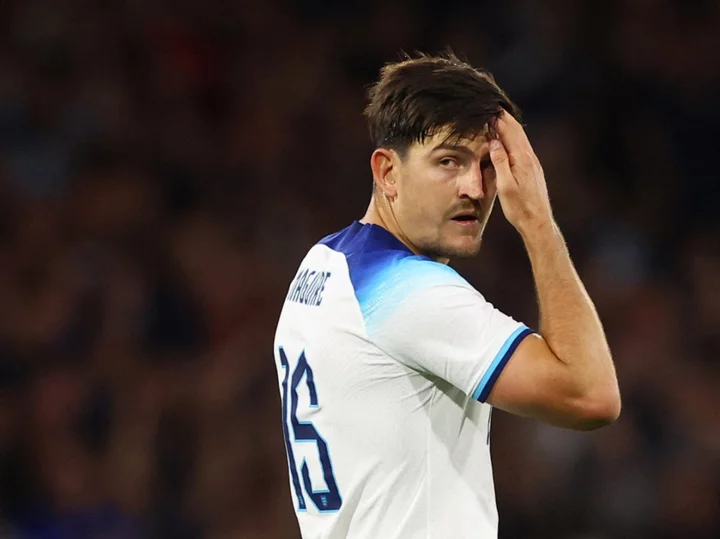
Harry Maguire’s humiliation is complete — Gareth Southgate must save him from himself
The Hampden roar has often been heard of late for a Manchester United player who was born in England. Just not this particular one. Scott McTominay, after all, was the scourge of Spain and is the joint top scorer in Euro 2024 qualifying, level with Romelu Lukaku and Rasmus Hojlund, just ahead of Cristiano Ronaldo and Harry Kane. Yet this wasn’t a McTominay goal that Scotland’s support were enjoying. The announcement of their scorer over the tannoy was met with the sort of noise that stems from schadenfreude. Harry Maguire, the most prolific centre-back in the history of the England national team, had struck for Scotland. In one respect, it was the product of a teasing cross by Andy Robertson, into the corridor of uncertainty, luring Aaron Ramsdale off his line, forcing Maguire to commit himself, resulting in an unstoppable finish that bisected goalkeeper and near post. And in another way, it had a sad inevitability. These things happen to Maguire. Were his form or luck or touch better, he would have diverted the ball past the goal, or straight to Ramsdale; perhaps missed it altogether. Now his last two goals have come for Scotland and Sevilla. “Just unfortunate,” said Gareth Southgate of his latest mishap, but Maguire can seem the most unfortunate of footballers, the sport’s equivalent of Unlucky Alf from The Fast Show. If something can go wrong, it often does when Maguire is around. For all his shortcomings as a defender – a lack of pace, particularly on the turn, and a capacity to look cumbersome – he seems on an extended run of bad luck that has lasted for around two years, since Ole Gunnar Solskjaer’s reign at Old Trafford started to unravel, since his career nosedived. He has lost the United captaincy; but for Southgate’s stubbornness, he may have lost his England place. But now so much with Maguire has a symbolic feel. When Andre Onana made his United debut in pre-season, when a goal was conceded and both Christian Eriksen and Maguire were culpable, it was the world’s most expensive centre-back he subjected to a very public lambasting. When Declan Rice scored the decisive goal for Arsenal against United last Sunday, it took a telling deflection off Maguire. And when it deflects off him, it somehow seems destined to go in. Such is the unrelenting cruelty of being Maguire; in the highest standard of tournament football, he has proved arguably one of the best centre-backs in England’s history and yet is now a figure of fun. “A joke,” said Southgate, though he was referring to the treatment of Maguire, to the unwanted reputation he has acquired, rather than the player. Yet the Scotland faithful bought into it. They cheered when he was brought on at half-time. They spent much of the next 45 minutes taunting him, making every five-yard square pass an event. They sang about Maguire and, ultimately, so did the England support, trying to reclaim him and hail him. “From a Scotland fan’s point of view, I get it, I have no absolutely no complaints of what they did,” Southgate said. “It is a consequence of ridiculous treatment of him for a long period of time, frankly, and I think our fans recognised, ‘Ok, there might be a bit of heat from our own supporters but we are not going to have it from others getting into him.’” Despite England’s ultimate 3-1 victory, it felt like 45 minutes of relentless torment. Perhaps unnecessary torture: Southgate sent him on at half-time when Marc Guehi went off. If Maguire has been barracked by some opposing fans, it was foreseeable that none would be as keen to heckle him as the Scots. England have had a restorative effect on him at times, amid his troubles with United, but there was nothing rejuvenating about this hostility. And Southgate, often the diplomat, became outspoken. He is his favourite defender’s foremost defender. A scapegoat culture has developed. “It is a joke,” he added. “I have never known a player to be treated the way he is; not from the Scottish fans, by our own commentators and pundits. They have created something that is beyond anything I have ever seen. “He has been an absolute stalwart for us in the second-most successful English team for decades. I have talked about the importance of our senior players, he has been crucial amongst that and every time he goes on the field the resilience he shows, the balls he shows is absolutely incredible. So he is a top player and we are all with him. I feel fairly strongly about it, yes.” Southgate’s argument is that Maguire will not hide. “He has fronted up as he always does, which is enormous credit to his character,” he said. The wider argument is that Southgate should hide him, that the rustiness of not playing enough for United will hinder England, that this seems a case of a player being afforded preferential treatment in selection. And thus one of the most torrid nights of Maguire’s career ended up with a resounding endorsement from his manager. But only after the sort of pratfall that may bring more jokes at Maguire’s expense. Read More Jude Bellingham makes centre stage his own as England’s youngest star sees off oldest rivals Terrible football or bad luck? Social media debates Harry Maguire’s ongoing decline Gareth Southgate says Harry Maguire criticism ‘beyond anything I’ve ever seen’ Criticism has not affected Harry Maguire, says England team-mate Aaron Ramsdale ‘Top-level’ England are the benchmark for improving Scotland – Lewis Ferguson Gareth Southgate says Harry Maguire criticism ‘beyond anything I’ve ever seen’
1970-01-01 08:00
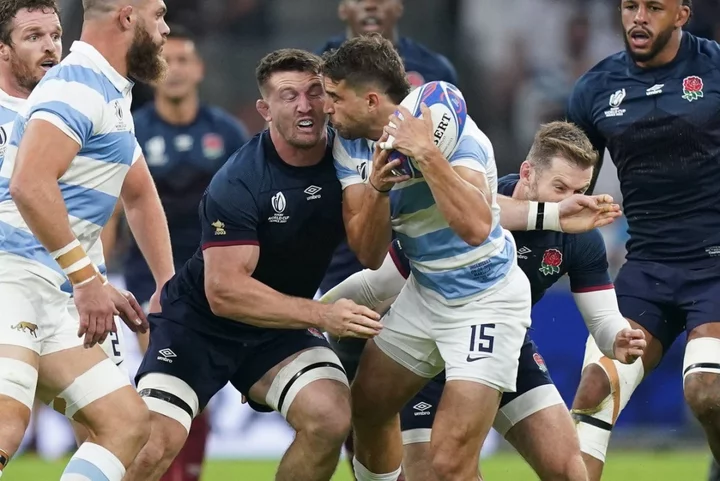
Rugby World Cup: Red card rules explained
Refereeing, head collisions and player safety again made the headlines on the opening weekend of the Rugby World Cup with a number of contentious incidents. The most high-profile came on Saturday when an England player was shown a red card for the fourth time this year, as Tom Curry was sent off early in his side’s win over Argentina, following a head-on-head collision with Juan Cruz Mallia. However, apparent inconsistency among officials irked many, especially on social media, with other incidents of head contact across the weekend not being punished as severely. Later in that same match, Santiago Carreras only received a yellow card despite his leap in attempting to charge down a George Ford kick seeing his hip make contact with the England No 10’s head. During South Africa’s impressive 18-3 win over Scotland, Jesse Kriel’s tackle on Jack Dempsey in which his head clattered into that of his Scottish opponent wasn’t even reviewed by the TMO and hasn’t subsequently been cited, while Chile captain Martin Sigren was only sin-binned despite a head-on-head collision while tackling a Japanese attacker. But what are the laws around head contact and high tackles that referees are following and how do they decide on the punishment? Here’s everything you need to know: What are World Rugby’s laws on head contact? Head-on-head contact in the tackle comes under Law 9 of the Laws of Rugby Union, which covers foul play. Law 9.11 dictates “Players must not do anything that is reckless or dangerous to others, including leading with the elbow or forearm, or jumping into, or over, a tackler” and Law 9.13 goes on to say “A player must not tackle an opponent early, late or dangerously. Dangerous tackling includes, but is not limited to, tackling or attempting to tackle an opponent above the line of the shoulders even if the tackle starts below the line of the shoulders.” If a player breaks these laws and the act is deemed to be reckless or dangerous, then the referee is entitled to issue a yellow or red card. World Rugby also clarify the intent of the laws, stating in their guidelines that: “ Player welfare drives World Rugby’s decision making for zero tolerance of foul play, especially where head contact occurs. The focus must be on the actions of those involved, not the injury – the need for an HIA [a Head Injury Assessment] does not necessarily mean that there has been illegal head contact.” What are the punishments for head-on-head contact? Ok, this is where things get technical and debates start to occur. In March 2023, World Rugby issued their latest ‘head contact process law application guidelines’ to guide referees on whether foul play has occurred and how it should be punished. The referee has to go through a four-step process (detailed below) to determine the extent of the foul play and the sanction. The four steps are: Has head contact occurred? Was there any foul play? What was the degree of danger? Is there any mitigation? Step 1 (has head contact occurred?) is relatively straightforward, with head contact including the head and the face as well as the neck and throat area. If any head contact is made at all, we move on to Step 2. Step 2 (was there foul play?) is a touch more complex. The referees are told to consider whether the head contact was either intentional, reckless or avoidable – e.g. the defender is always upright. If it was, the tackler will be penalised and they move on to Step 3. However, if the head contact was deemed not to be foul play, the game continues. Step 3 (what was the degree of danger?) – judged from high to low – determines the initial punishment. A degree of high danger is judged on any of: direct contact rather than indirect, a high-force impact, a lack of control from the tackler, the incident occurring at high speed, the tackler leading with the head/shoulder/elbow/forearm or the tackle being reckless. If the referee judges there to be a high degree of danger, a red card will be shown. Meanwhile, low danger is judged as indirect contact, low force, low speed or no leading head/shoulder/forearm/swinging arm and a yellow card or even just a penalty to the opposition may be awarded. The final step, Step 4 (is there any mitigation?) determines whether the punishment can be reduced by one grade (i.e red card down to yellow card or yellow card down to just a penalty). Mitigation includes a sudden or significant drop in height or change in direction from ball carrier, a late change in dynamics due to another player in the contact area, a clear effort from the tackler to reduce their height or the tackler having no time to adjust. However, mitigation will never apply for intentional or always-illegal acts of foul play. What about the Foul Play Review Officer/Bunker review? Introduced for this World Cup was the Bunker review system. This allows the referee to issue a yellow card to a player, sending them to the sin-bin while play goes on, where a Foul Play Review Official (FPRO) will then take another look at the incident and determine if the yellow card should be upgraded to red, allowing the game to continue rather than a long stoppage to debate this. This is what happened to Curry against Argentina. The referee crosses their arms to indicate a Bunker review will take place. Once a player is in the sin-bin, the FPRO has up to eight minutes to review the decision and decide if it warrants upgrading to a red card. If not, the player will return to the field after their 10 minutes in the sin-bin has elapsed. Read More Tom Curry ban: How many games will England star miss after red card vs Argentina? ‘Ruining this World Cup’: TV presenter slams ‘grotesque’ refereeing as Wales beat Fiji George Ford plays the pragmatist as England finally come to the boil in Marseille cauldron South Africa explain use of signals during Scotland win National anthems are ruining the Rugby World Cup – they must be changed now Tom Curry banned after red card in Rugby World Cup against Argentina
1970-01-01 08:00

Scotland vs England player ratings: Jude Bellingham the star amid Andy Robertson’s nightmare
Scotland hosted England in a 150th anniversary of their first-ever meeting; this time around it was the Three Lions who triumphed with a routine and comprehensive 3-1 victory. Phil Foden and Jude Bellingham scored within minutes of each other in the first half, before Harry Maguire turned into his own net to close the gap past the hour mark. Harry Kane wrapped up matters though as England took the bragging rights. Here are the player ratings from Hampden Park. Scotland Angus Gunn - 6. Nothing he could do about either goal, banged past him from close range on both occasions. Massive save from Eze at 2-1 but beaten by Kane one-on-one. Ryan Porteus - 5. Did well in direct duels but struggled to keep pace once England’s runners from deep started showing their movement and ability to swap spaces. Jack Hendry - 7. Important recovery interception to thwart England’s best move on half-hour. Like Porteus, couldn’t get tight enough when the passing started to flow. Kieran Tierney - 6. A few decent moments for Scotland’s attack as he looked to overlap, but couldn’t get close defensively and pulled out of shape for the third in particular. Aaron Hickey - 6. A good outlet at times and looked to be able to beat Tierney at times, but the final pass and cross was lacking. Billy Gilmour - 5. All but ran the game against England a couple of years ago but this time around was swamped in the middle and easily bypassed. Callum McGregor - 6. Hard-working and tried to keep his side moving forward but was also outnumbered and certainly out-passed. Andy Robertson - 4. A nightmare couple of minutes as he played on Marcus Rashford in the build-up to the first then gifted possession inside his own box for 2-0. Caught wrong side of Kane for the third, too, though did deliver the cross for Maguire’s own goal. Scott McTominay - 5. Didn’t offer anywhere near enough, perhaps showing his lack of match fitness. John McGinn - 7. Bustling and energetic, twice going close in the second half with a hammered shot and an attempted header which hit his shoulder. Che Adams - 5. Toiled away without much service in the first half, then when his team tried to push on at the start of the second he was unable to offer hold-up play or movement to aid the attack. Subs: R. Christie 7, L. Dykes 6, L. Ferguson n/a, S. Armstrong n/a. England Aaron Ramsdale - 7. Good footwork for the most part but never really tested as a last line of defence. Kyle Walker - 8. Drilled a half-volley wide in the first half and led the best move on the counter soon after. Definitely tried a shot which turned into an assist for the opener. Marc Guehi - 7. Really solid first half where he made two good interceptions with aerial deliveries and played out nicely. Subbed at the break. Lewis Dunk - 8. Similar to his centre-back partner, was good across the board doing the job which was needed. Kept Che Adams very quiet throughout and made a big block just past the hour mark. Kieran Trippier - 7. Filled in at left-back once more and didn’t get forward to quite as good effect as he can down the right, but ensured the team was balanced and kept possession. Kalvin Phillips - 7. A rare run-out for so many minutes for the Man City man. Technically looked perfectly fine and did his defensive work well for the most part, though some of Scotland’s quicker counters did leave him chasing dust. Declan Rice - 7. Very much stuck to his defensive responsibilities and did them perfectly well. Set a strong platform for the attackers to shine from. Phil Foden - 8. Scored the first and involved in setting up the second. Could have netted earlier too but spooned a shot over, then almost made a third on the brink of half-time. Involved in most of the team’s best work. Jude Bellingham - 9. A hit-and-miss start to the game but was in the right place to lash home England’s second. From that point on he was the best on the park, creative and aggressive throughout and set up Kane with a great turn and through pass. Marcus Rashford - 7. A good outlet in early spells for England but never really had the beating of his man one-on-one or a finishing touch. Really decent link play in quick transitions but a bit lacking inside the box. Harry Kane - 7. A mostly quiet game for the Bayern striker who couldn’t get too involved in most of the best England build-up play. A few dangerous balls from deep or wide, but more would be expected - still found space once, and scored. Subs: H. Maguire 4, E. Eze 6, B. Saka 7, C. Gallagher n/a, C. Wilson n/a. Read More Maguire’s humiliation is complete — Southgate must save him from himself Terrible football or bad luck? Social media debates Harry Maguire’s ongoing struggles Scotland handed lesson on ‘enormous gap’ to England, admits Graeme Souness Bellingham makes centre stage his own as England’s youngest star beats oldest rivals Scotland vs England LIVE: Result and reaction as Kane wraps up Three Lions win England want Newcastle duo amid call-up tug-of-war with Scotland
1970-01-01 08:00
